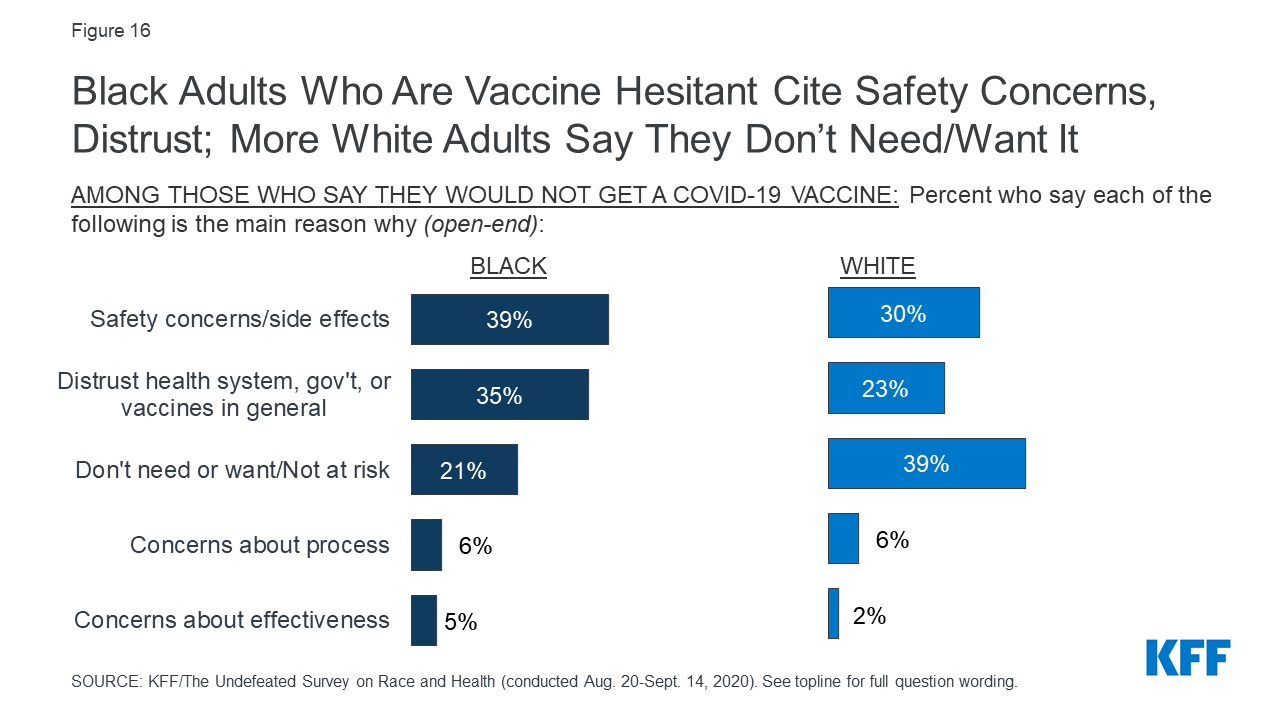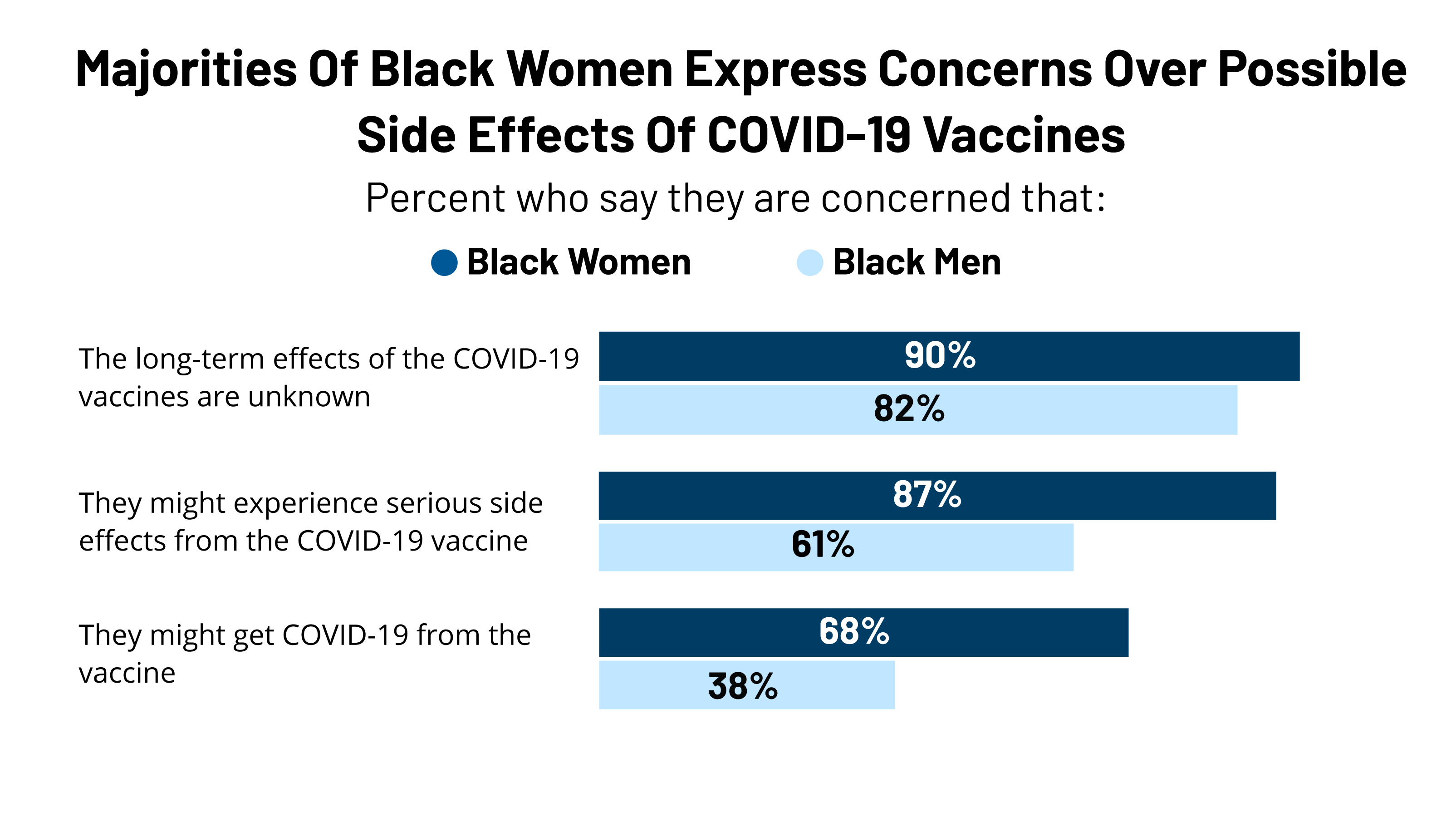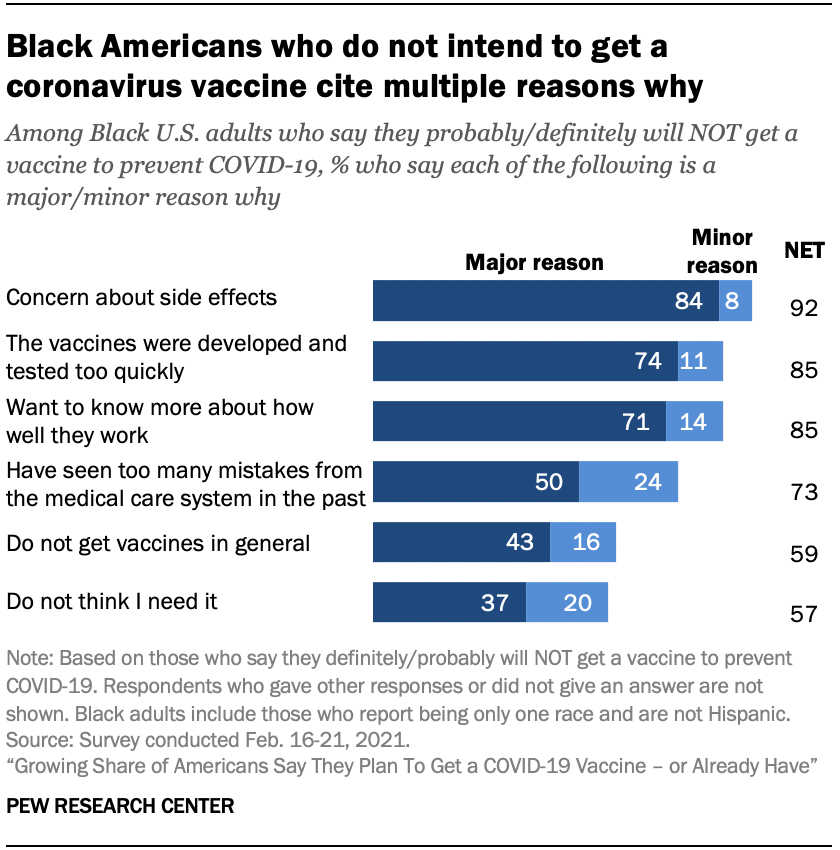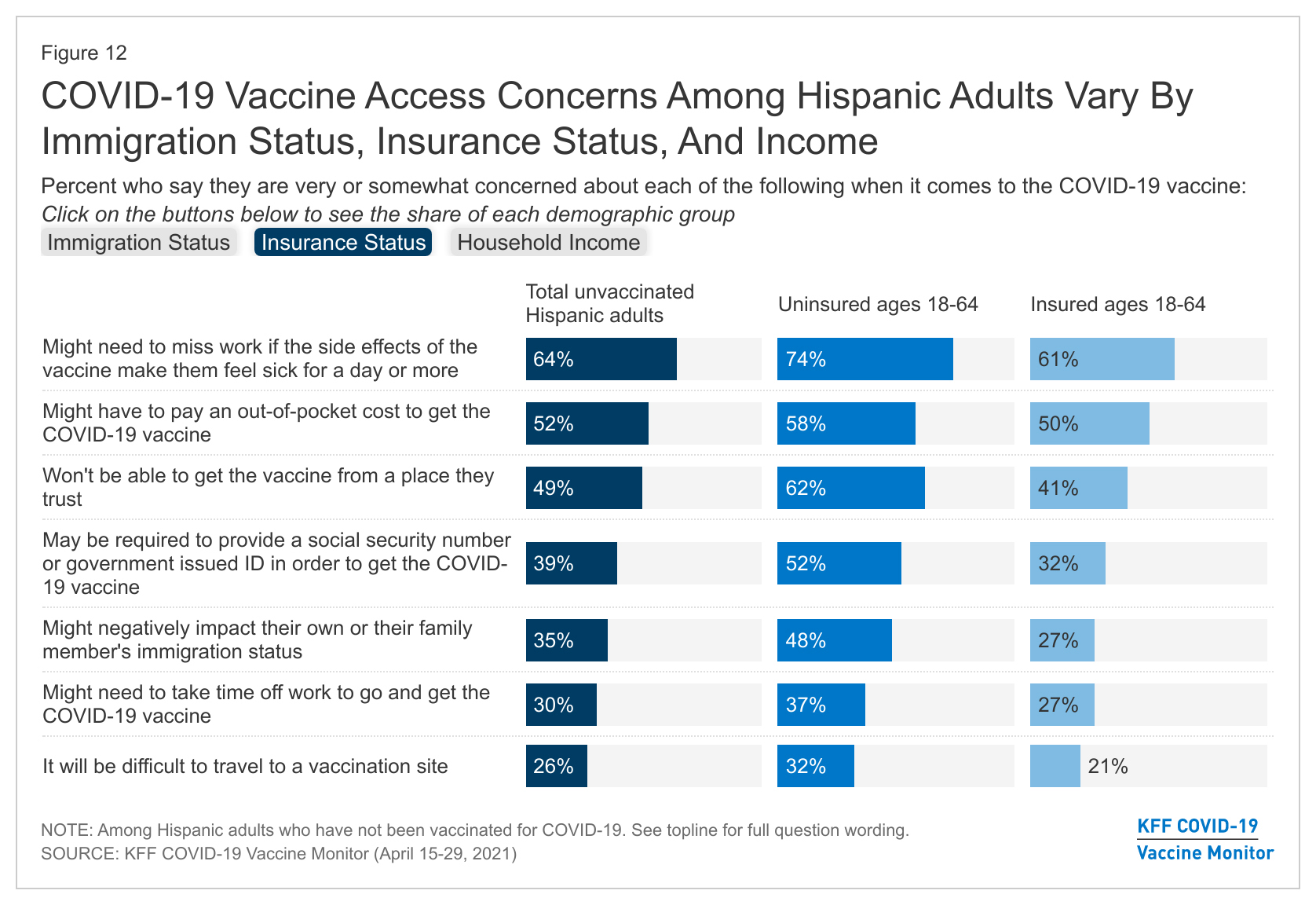Part
01
of one
Part
01
Vaccine Hesitancy: Black and Hispanic Communities
Key Takeaways
- High levels of distrust in the US medical system, due to the recent political climate as well as historic racism in the medical industry, is a leading factor against taking the COVID-19 vaccine for Black Americans.
- Both Black and Hispanic individuals were highly concerned about vaccine safety and side effects.
- Both Black and Hispanic individuals were swayed by misinformation about the COVID-19 vaccine.
- Hispanics had unique immigration-related concerns about obtaining the COVID-19 vaccine that led to vaccine hesitancy.
Introduction
Below, we review key factors driving COVID-19 vaccine hesitancy among the Black and Latino communities in the US.
Vaccine Hesitancy Among Black Communities
Distrust of Medical Establishment
- Unique to the Black community is vaccine hesitancy due to "unethical historical practices in research toward the black community." Black Americans, knowledgeable about historic mistreatment of the Black community by the medical community, were extremely hesitant to trust the medical and scientific community regarding the COVID-19 vaccine. Black communities are well aware of "cruel experimentation in the past, most notably in the U.S. Public Health Service Syphilis Study at Tuskegee."
- A RAND Corporation study found that vaccine-hesitant Black Americans were more likely to distrust a COVID-19 vaccine and distrust healthcare providers.
- According to a PEW Research Center poll, 50% of Black Americans stated they "have seen too many mistakes from the medical care system in the past" as a major reason against getting a COVID-19 vaccine. 24% stated it was a minor reason.
- One participant in an Oxford University Press for the Infectious Diseases Society of America study stated: "I'm already against it. I'm paranoid, I keep getting, when I hear that Tuskegee experiment. But I stay away from that. I wouldn’t get a vaccine."
Concern at Rapid Development of COVID-19 Vaccine
- According to a paper published by Oxford University Press for the Infectious Diseases Society of America in February 2021, which drew results from surveys conducted in July and August 2020, one leading reason why Black communities were COVID-19 vaccine hesitant was "the belief that vaccine development was rushed and therefore unsafe."
- One participant in the study described their concern: "No, I will not be taking a [COVID-19] vaccine … One, they didn't have enough studies. It takes at least a year and a half, two years or three years for them to complete a study and they did it in four months."
- According to a Pew Research Center study, 74% of vaccine hesitant Black Americans stated the pace at which the vaccines were developed was a major reason for their hesitancy. 11% cited it as a minor reason.
- Many Black Americans chose to "wait and see" how the COVID-19 vaccine affected others before going to get a vaccine. According to Kaiser Family Foundation, as of March 2021, 25% of unvaccinated Black Americans stated they were still going to "wait and see" how the vaccine affected others before getting the vaccine themselves.
Political Environment
- At the time of the vaccine release, many Black Americans were concerned about the connection between Trump and the vaccine, according to First Draft News. First Draft News stated: "The perceived self-aggrandizing motivations of former US President Donald Trump made others distrustful of the safety of Covid-19 vaccines."
- Along with concerns over Trump, there are also concerns in the Black community over racism and the vaccine, especially in light of the George Floyd murder. According to a respondent in the Oxford University Press study, "And with — what's his number, 45, 46 —what's his number? With that guy in office, I used to look at how he's been bouncing Doctor Fauci around. Everybody is on high alert, in the black community, everybody is on high alert, very distrusting, because we don't know what's going to be perpetrated against us. I mean just on another level, you see what's going on with police brutality and things, things have been caught on tape and it's not being addressed, so [it’s not so] so weird in thinking that the vaccines that go to zip codes 19131, 19139, 19104 would be tainted or just — it's just that that paranoia, but there's substance to the paranoia."
Uncertainty In Effectiveness of the Vaccine
- According to a RAND corporation study conducted in December 2020, among Black Americans that stated they would not get the vaccine, 50% were unsure of the efficacy of the vaccine, while a quarter stated they "had doubts" about the effectiveness.
- The Oxford University Press study also found that Black Americans questioned the efficacy of the COVID-19 vaccine.
- According to a Pew Research Center poll, 71% of vaccine-hesitant Black Americans stated that they wanted to "know more about how well [the vaccines] work."
Safety Concerns/Concern About Side Effects
- According to a paper published by Oxford University Press for the Infectious Diseases Society of America in February 2021, which drew results from surveys conducted in July and August 2020, Black Americans were as concerned about the COVID-19 vaccine as they generally are about other vaccines. Respondents reported concerns over getting COVID-19 from the vaccine (which is impossible with the COVID vaccine but possible with other vaccines such as the flu shot) and general concerns over lack of safety data on the vaccine.
- For example, one participant from the Oxford University Press study stated: "It is too new. You don't really know, and I don't want to put anything in me even with a 10% chance that I might get it because I have underlying condition, so I don't know if that's going to make me sick, they don't know if you're going to get it, like you know how you could still get the flu even if you get a flu shot."
- According to the March 2021 Kaiser Family Foundation COVID-19 Vaccine Monitor, 76% of Black Americans were concerned about experiencing serious side effects from the vaccine, while 66% were concerned that these side effects may be worse than COVID-19 itself. 57% were concerned that vaccine side effects would cause them to miss work.
- According to a Pew Research Center poll, among vaccine-hesitant Black Americans, 84% cited concern about side effects as the main reason for not getting the vaccine.
Misinformation
- According to First Draft News, misinformation is a contributing factor to vaccine hesitancy among Black Americans. Popular misinformation narratives among the community include: beliefs that the COVID-19 is part of a eugenics program; that COVID-19 vaccines contain tracking microchips; that COVID-19 is not dangerous; that vaccines cause autism; that one's immune system is enough of a defense against COVID-19; that the vaccine was developed only for the profit of "big pharma"; and that the COVID-19 vaccine can affect fertility.
- According to the March 2021 Kaiser Family Foundation COVID-19 Vaccine Monitor, 50% of Black Americans were concerned that they could get COVID-19 from the vaccine.
Visuals
Vaccine Hesitancy Among Hispanic Communities
Concern Over Vaccine Safety and Side Effects
- One leading concern for Hispanics leading to vaccine hesitancy is the overall safety and potential side effects of the COVID-19 vaccine.
- According to a Kaiser Family Foundation survey in March 2021, 77% of Hispanic adults were concerned with vaccine side effects, and 54% were concerned that they could miss work due to vaccine side effects.
- A Kaiser Family Foundation survey in December 2020 found that 43% of Hispanic adults chose to "wait and see" how the COVID-19 vaccine worked for other people before making a decision for themselves.
- A study by the COVID Collaborative found that 66% of Latinos did not believe the COVID-19 vaccine would be safe as of December 2020.
- A UNIDOS US survey in October 2020 found that among Hispanics that were not planning to get vaccinated, 79% cited the potential for long-term negative effects from the vaccine and 76% cited general concern over side effects from the vaccine.
Concern about Potential Cost of Vaccine
- Among Hispanic Americans, concern over the potential cost of the COVID-19 vaccine is a barrier to obtaining the vaccine, especially since many are uninsured and do not regularly see a healthcare provider, according to the Kaiser Family Foundation.
- First Draft News also found that among Hispanics lack of childcare and paid time off to get the vaccine were major barriers.
- According to a Kaiser Family Foundation poll, 52% of unvaccinated Hispanics were concerned about having to pay for the shots.
- According to an October 2020 poll from UNIDOS US, 60% of Hispanics that did not want the vaccine were concerned it would cost too much.
Immigration-Related Concerns
- According to the Kaiser Family Foundation, among the Hispanic population, immigration-related concerns made some people hesitant to get the vaccine. For example, some Hispanic people were concerned that obtaining the vaccine would make them in-eligible for citizenship, due to the "public charge inadmissibility determination."
- According to First Draft News, Hispanics also viewed COVID-19 vaccination sites as potential "deportation traps." According to one Hispanic journalist: "It’s that the fear of the Covid vaccine is that clinics are just traps for people. If you were undocumented, you would maybe get reported on or something. We were going through Trump and that happened. Someone would go to do the things they’re supposed to do about their status or whatever. They weren’t a citizen but they were doing what they needed to do according to the lawyers or whatever, and then they got arrested or deported."
- Among unvaccinated Hispanics, 39% were concerned about social security numbers being required for vaccination and 35% were concerned that getting the vaccine would negatively impact their own or a family member's immigration status, according to the Kaiser Family Foundation.
Misinformation
- Misinformation is a compounding factor in vaccine hesitancy among Hispanic populations, especially younger Latinos.
- According to Laura Pichardo Cruz, executive director for Hope Community Center in Apopka, Carolina: "There are all these myths about will it change my DNA, will it have certain side effects, how was the vaccine created, and does that have some sort of negative effect depending on my religious beliefs."
- Some of this misinformation is being specifically targeted at Spanish-speaking communities via Spanish language misinformation campaigns on social media.
- One misinformation narrative that is especially believable to Hispanic individuals is that the COVID-19 vaccine causes infertility, due to past and current mistreatments of Hispanic women in regard to their reproductive health.
Effectiveness of the Vaccine
- Hispanics were also concerned with the efficacy of the COVID-19 vaccine, with 68% of those that did not want the vaccine stating that it would be ineffective, according to an October 2020 poll from UNIDOS US.
- According to a poll by the COVID Collaborative, 60% of Latinos did not trust the vaccine would be effective.
Visuals
Research Strategy
In order to provide a full picture of vaccine hesitancy among both Black and Hispanic communities, the research team included both current and past motivating factors for COVID-19 vaccine hesitancy in the communities. To identify motivating factors, the research team looked for factors that were mentioned by at least two reputable sources, as well as data and/or direct quotations from community members supporting the inclusion of each factor. Finally, for each community, the research team looked for three to five visuals illustrating the causes for vaccine hesitancy.




